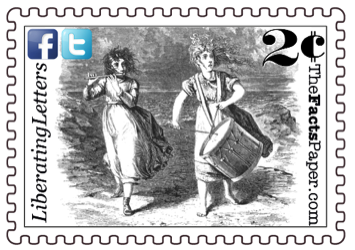September 24, 2018
Dear Liberty,
Rebecca and Abigail enjoyed the pleasant September day while their mother remained inside the house. As Rebecca rounded the lighthouse, she saw the British warship in Scituate Harbor. When Abigail met up with her, the two noticed the British soldiers rowing towards the shore. They knew the Red Coats were coming to burn more ships, steal supplies, and possibly burn the town.
During the summer of 1814, as the War of 1812 waged on, British ships on several occasions invaded Scituate Harbor, south of Boston Harbor, bringing havoc and destruction to the American citizens living there. Soldiers would burn civilian ships while confiscating others, many of which were the homes of the residents. When ships arrived again in early September, the Bates girls understood the threat they faced. Their quick actions made the girls legends in Scituate, Massachusetts, earning them the nickname the “American Army of Two”.
With their father, Simon Bates, away with the rest of the children, no one was there to protect the lighthouse or the shore. Then Rebecca got an idea. The girls quickly ran to the house, rushing to the living room where they kept their instruments. The religious family spent many an evening singing and playing their favorite hymns. A Revolutionary War veteran, Simon also passed his love for military music on to Rebecca. She retrieved the fife as Abigail grabbed the drum. The girls hid themselves in the trees, rocks and brush as the Red Coats rowed closer.
Starting quietly, the girls began a lively rendition of 'Yankee Doodle', increasing their volume as they played. Out of view, the soldiers could not see what was coming. However, the music convinced them an American militia was quickly approaching the shores. Not wanting a fight, the British returned to their ship and withdrew from the area.
While the incident seems unlikely and folklore, substantial evidence exists to convince Scituate Historical Society and others that the Bates girls did dupe the British Navy.
Simon and Rachel Bates moved their large family into the lightkeepers' house at Scituate Harbor in 1811. A family Bible indicates Rebecca was 21 and Abigail was 17 when the British arrived that fateful September day. However, as was common at the time, individuals frequently lost track of their ages as birthdays were not often celebrated. After the war, Bates continued on as the Scituate Lighthouse keeper until his death in 1834. Rebecca and Abigail, neither of whom married, then moved into what use to be their grandfather's house. Other family members, as well as boarders, shared the residence with the sisters until their deaths.
Following the war, for years Rebecca sold affidavits, officially declaring her story for 10 cents apiece. She also loved regaling locals with her story, such as C. Wellington Furlong. As a small boy, Furlong spent his summers in Scituate. He later remembered the elderly lady he use to visit. “Next door to the Merritts lived Becky Bates, then a very old woman, who, in boyish wonderment I often watched her pull her corn cob pipe and listen to her story.”
In July of 1874, St. Nicholas Magazine published an article by Charles Barnard regarding the event. He spoke to Rebecca Bates, who was roughly 80 at the time, and wrote a tale for young children entitled "Rebecca the Drummer". He took some liberty in his article, embellishing certain aspects to entertain his young readers. According to Barnard, Rebecca played the drum and not the fife. In addition, the second girl was a friend named Sarah Winsor, even though the consensus is it was Abigail. Regardless, is remains an intriguing recount of the event.
Upon Rebecca's death, St. Nicholas Magazine reprinted an obituary of her, stating her age as 88 years old. It also mentioned Abigail as alive and 80 at the time, yet that is not consistent with the family Bible. Regardless, when Abigail died some years later, it is reported that uniformed G.A.R. (Guard Army of the Republic) soldiers carried her coffin to her grave. Bob Gallagher, Scituate's lightkeeper in 2014, stated that in the 1880's, the United States Congress contemplated legislation awarding the sisters an annual pension of $25. Unfortunately, the ladies died before the bill could be passed. However, they are forever imprinted in American History as the "Army of Two" that saved Scituate, Massachusetts.
Liberty, actor Christopher Reeves once stated,
“A hero is an ordinary individual who finds the strength to persevere and endure in spite of overwhelming obstacles.”
As you journey through life, you will find yourself in situations that seem hopeless. But never let yourself think you are too weak or not able to overcome the conflict. If two young girls can trick an entire British fleet with a fife and a drum, then nothing is impossible.
That’s my 2 cents.
Love,
Mom
AMERICAN ARMY OF TWO



